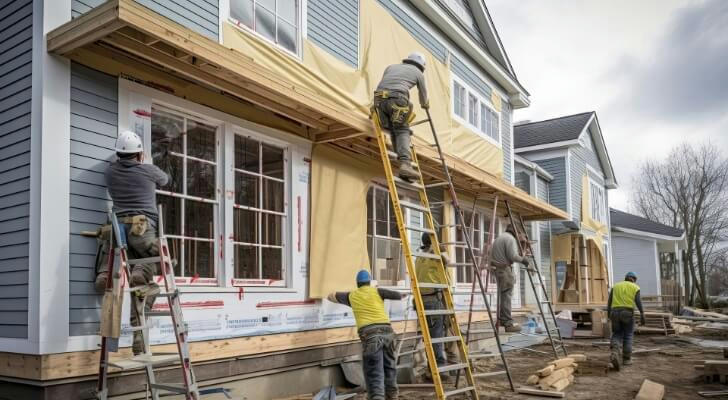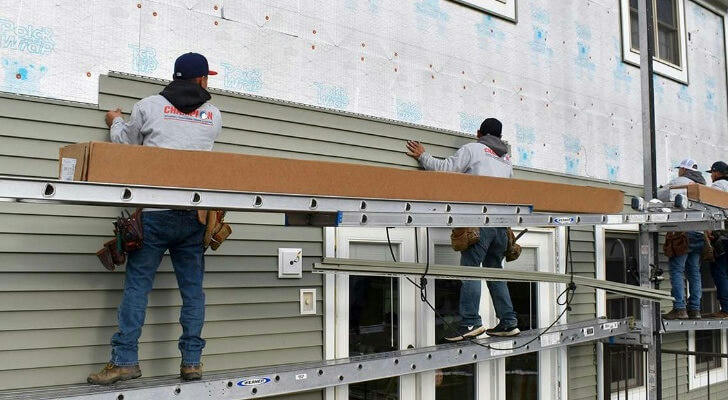Drywall Installer Recruitment: Offering Great Benefits and Career Growth
With the construction and renovation industries expanding rapidly, the demand for skilled drywall installers is on the rise. This profession offers stable, well-paying jobs with significant career growth opportunities. Drywall installers are integral to the completion of residential and commercial construction projects, ensuring that walls and ceilings are finished to high standards. As companies seek to attract and retain top talent, offering competitive salaries, professional development programs, and training opportunities has become essential to success in the field.

1. Main Responsibilities of Drywall Installers
The core responsibility of a drywall installer is to measure, cut, and install drywall panels on walls and ceilings. This work requires precision and an understanding of various materials such as drywall, fiberglass, and fire-resistant boards. The job often involves working with large panels, which can be physically demanding, and requires skill in securing the panels using nails, screws, or adhesive. Drywall installers may also be required to install insulation materials and specialty products such as acoustic panels or fireproof drywall in specific areas of the building.
The profession also requires attention to detail and a commitment to safety. Drywall installers must follow strict safety guidelines, as the work can involve lifting heavy materials, working with sharp tools, and performing tasks on ladders or scaffolding. Ensuring a smooth, even finish is crucial for the success of the project, as any imperfections can be costly to fix later on.
Training Example:
A construction company based in Atlanta implemented a mentoring program to help new drywall installers get acclimated to the job. New employees are paired with experienced installers for six months, allowing them to learn through hands-on training and receive immediate feedback. This approach resulted in a 30% reduction in installation errors and fewer delays in project timelines. Employees reported greater job satisfaction, and the company noted higher-quality results on projects.
2. Salary and Benefits
Drywall installers typically earn competitive salaries, although the amount can vary depending on factors such as location, experience, and the type of projects they work on. According to the U.S. Bureau of Labor Statistics, the average salary for drywall installers in 2023 was about $48,000 per year. However, experienced installers working in high-demand areas can earn considerably more. For example, in cities like San Francisco or New York, an experienced drywall installer can make up to $75,000 annually, while in areas with lower demand, salaries might hover around $50,000.
In addition to competitive salaries, many companies offer benefits packages that include health insurance, retirement savings plans, and paid time off. Drywall installers working for unionized companies may also receive additional benefits, such as higher hourly wages, more paid vacation days, and access to better retirement plans. Many companies also offer performance-based bonuses, which can significantly increase overall compensation.
Incentives and Rewards:
To further motivate employees and encourage high performance, some companies offer performance-based bonuses. For example, a construction firm in Los Angeles introduced a system where installers can earn up to $5,000 in annual bonuses based on project completion, quality of work, and client satisfaction. This reward structure helped increase employee retention by 20%, as workers felt their efforts were recognized and rewarded. In addition to financial rewards, the company also introduced a recognition program where top performers were publicly acknowledged during company meetings.

3. Training and Career Growth
Training is a key component of success for drywall installers, as the profession involves a combination of technical skills and safety knowledge. Most drywall installers start with basic on-the-job training, learning the fundamentals of installation, measurement, and finishing techniques. However, for those looking to advance in the field, additional training and certification programs are available.
Many companies offer in-house training or partner with vocational schools to provide employees with opportunities to develop their skills further. Drywall installers who complete training programs may receive certifications that open the door to higher-paying roles and more advanced projects. For example, those who complete specialized courses in fire-resistant drywall installation or soundproofing can qualify for roles that involve more complex tasks and larger-scale projects.
Career Development Example:
A construction company in Miami partnered with a local vocational school to offer certified drywall installation courses. These courses cover essential skills like drywall cutting, measuring, and finishing, as well as specialized techniques for soundproofing and fireproofing. After completing the course, employees receive certification that makes them eligible for promotions and higher-level projects. Jack Wilson, an installer who started at $20 per hour, completed the certification program and was promoted to lead installer, earning $32 per hour as a result.
This kind of career development opportunity not only helps employees improve their skills but also strengthens the company’s workforce, ensuring that they have the expertise necessary to take on complex projects.

4. Career Opportunities and Advancement
Drywall installation offers a clear path for career advancement. Installers with experience and additional certifications can move into supervisory roles or become project managers overseeing entire teams of installers. Some drywall installers choose to specialize in certain areas, such as commercial construction or historical restoration, which can also lead to higher-paying opportunities.
As drywall installers gain experience, they may also move into positions where they manage large projects, coordinate with other trades on-site, and ensure that everything is completed on time and within budget. For those with leadership skills, becoming a team supervisor or project manager can be a rewarding next step.
Advancement Example:
Maria Gonzalez, a drywall installer in Chicago, started as an entry-level worker and demonstrated exceptional leadership and project management abilities. After five years, she was promoted to site supervisor, responsible for managing a team of 15 installers. Maria’s salary increased from $45,000 to $63,000 as part of her promotion. The company’s internal promotion system is designed to encourage employees to take on more responsibilities, providing a clear path to higher-paying roles.
5. Tools and Technology in the Industry
The drywall installation industry is increasingly adopting new tools and technologies to improve efficiency and reduce errors. Modern tools like laser measuring devices, power sanders, and automated drywall cutting machines have revolutionized the way drywall is installed. These tools help workers complete tasks more quickly and with greater precision, which is essential for staying competitive in the fast-paced construction industry.
Some companies are also using software to streamline project management, track inventory, and schedule work, helping to ensure that projects are completed on time and within budget. Technology is also helping companies improve safety, with advanced tools designed to minimize the risk of injuries on the job.

Technology Example:
A Dallas-based construction company adopted advanced technologies like laser measuring tools and automated drywall cutters. These tools helped reduce measuring and cutting time by 40%, allowing workers to complete projects faster and with fewer errors. The company reported a 25% increase in overall project efficiency and a 15% increase in revenue due to the adoption of these technologies. The use of these tools not only improved productivity but also allowed the company to take on more projects and meet client deadlines more effectively.
Conclusion
The profession of drywall installation offers a stable career with good pay and clear growth opportunities. By offering competitive salaries, comprehensive training, and performance-based rewards, companies can foster a motivated and skilled workforce. Real-world examples show that providing career development opportunities, adopting modern technologies, and recognizing top performers can significantly improve employee satisfaction and business success.
For drywall installers, this profession not only offers job security but also provides a pathway for career advancement. Those willing to invest in their skills and take on leadership roles can enjoy a rewarding and prosperous career. As the construction industry continues to grow, so too will the opportunities for drywall installers, making it an excellent field for those looking for stability and long-term career growth.
By offering training, career development, and the latest tools, companies can make drywall installer positions even more attractive and rewarding, benefiting both employees and employers.
